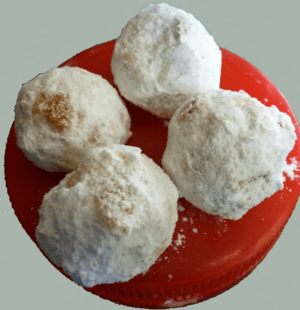Kue makmur facts for kids
 |
|
| Alternative names | Kuih makmur |
|---|---|
| Type | Cake, pastry, kue |
| Course | Snack, dessert |
| Place of origin | Brunei, Indonesia, Malaysia and Singapore |
| Region or state | Southeast Asia |
| Created by | Malays |
| Serving temperature | room temperature |
| Main ingredients | Butter, ghee and flour |
Kue makmur (in Malay, it's called kuih makmur) is a super yummy traditional cookie or pastry. It's a popular treat in countries like Brunei, Indonesia, Malaysia, and Singapore. This special cake is made from simple ingredients like butter, ghee (a type of clarified butter), and flour. People often enjoy kue makmur during big celebrations, especially for Eid al-Fitr. You can easily spot kue makmur because it's usually white and shaped like a small, round ball.
Where Does Kue Makmur Come From?
The exact beginning of kue makmur is a bit of a mystery. Many people believe it came from a Middle Eastern cookie called Ma'amoul. Arab merchants might have brought the idea of ma'amoul to the Malay Archipelago a long time ago.
Since then, kue makmur has become a beloved part of the traditional sweets in Brunei, Indonesia, Malaysia, and Singapore. It's a sweet reminder of shared culture and history across these countries.
A Special Stamp
In 2015, kue makmur was even featured on a series of special stamps in Singapore! This shows how important and well-loved this traditional cookie is. The name "makmur" loosely means "prosperous" or "flourishing." So, you could think of them as "prosperous cookies."

